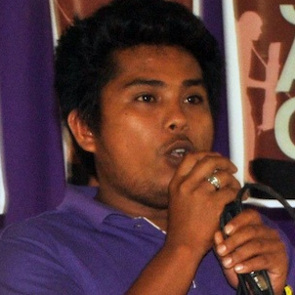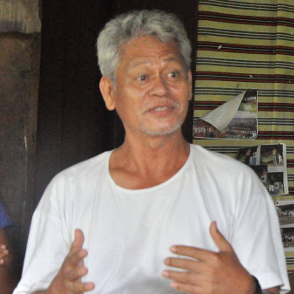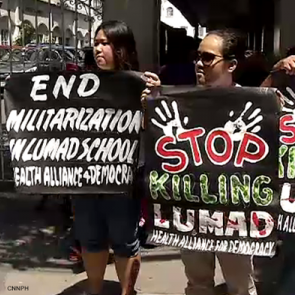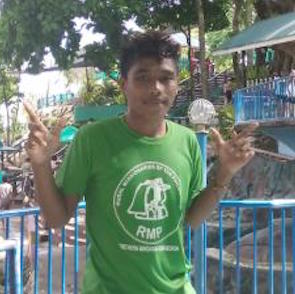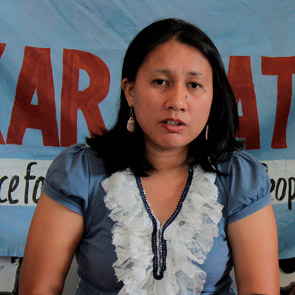UPR Submission - Philippines
Submission to the 27th Session of the Universal Period Review, May 2017
Date Submitted: 6 October 2016
Summary of main concerns
1. This submission focuses on the situation for human rights defenders (HRDs) in the Philippines and covers developments in the years 2013-2016.
2. The situation of HRDs in the Philippines remains critical. Front Line Defenders received reports of the killing of at least 31 HRDs in 2015. Global Witness has ranked the country the second most dangerous country for HRDs. Defenders of ESC rights, including land and environmental defenders and defenders from indigenous communities, face significant risks in their attempts to peacefully defend their land or oppose major industrial projects: over 90% of the killings of Philippine HRDs in 2015 were related to environmental, land or indigenous peoples’ rights.
3. The use of the judicial system against HRDs is also widespread. HRDs are frequently charged with libel if they report or express critical opinions regarding acts of public officials or public figures, including when exposing instances of corruption. In numerous cases HRDs have been accused of violent crimes, including kidnapping, trafficking or murder, or of being members of the New People’s Army (NPA), the armed wing of the Communist Party of the Philippines.
4. Impunity for grave human rights violations such as extrajudicial killings, enforced disappearances and torture also remains widespread. A 2015 study ranked the country as having the highest impunity rate worldwide.
Development since the previous UPR
5. During its previous UPR in 2012, the Philippines accepted two recommendations on HRDs, concerning the protection of HRDs from extrajudicial killings and enforced disappearances. During the examination, the government assured that it would take “firm measures to address the problem of extrajudicial killings and enforced disappearances.”
6. Despite the assurances, extrajudicial killings and targeted attacks against HRDs have continued to take place. There are very real fears that under the new administration of President Rodrigo Duterte such killings will increase as official encouragement for the killing of those suspected of being involved in the illegal drug trade may have the knock-on effect of lowering the cost of killing HRDs.
7. Three additional recommendations on HRDs during the previous UPR were not accepted by the Philippines. They concerned cooperation with the United Nations, and in particular country visits by the Special Rapporteur on Human Rights Defenders (requests were made in 2008, 2010 and 2012) and the Working Group on Enforced or Involuntary Disappearances (2013, 2015). All their requests remain pending.
Legal and institutional framework
8. A number of pieces of legislation impose restrictions on freedom of expression and assembly and have been used against HRDs. They include Batas Pambansa 880 (on rallies and public assemblies) and the Anti-Terrorism Law. The Anti-Cybercrime Law, enacted in 2012, includes provisions criminalising libel, curtailing press freedom and freedom of speech.
9. Libel is a criminal offence pursuant to Articles 353-362 of the Revised Penal Code. People convicted of libel may be imprisoned for up to four years. The definition of libel is particularly problematic as Article 354 states that “every defamatory imputation is presumed to be malicious, even if it be true”, which places the burden of proof on the accused. As some of the examples in this report indicate, charges of libel have been used extensively against HRDs.
10. The Executive Order 546 (EO 546) legitimises private armed groups and paramilitary organizations and allows them to conduct operations throughout the country. These groups are allegedly involved in grave human rights violations including extrajudicial killings, disappearance and torture. During the 2012 UPR, several states recommended that the government repeal EO 546.
11. The Philippine government has created multiple bodies and mechanisms to investigate and prosecute cases of grave human rights violations. This includes the Inter-Agency Committee on Extra-Legal Killings, Enforced Disappearances, Torture and Other Grave Violations of the Right to Life, Liberty and Security of Persons, established by Administrative Order 35 (AO 35) in 2012, under the administration of former President Aquino. However, cases of killings of HRDs mentioned in this report remained unpunished and without proper investigation.
12. The Commission on Human Rights (CHR), which is the National Human Rights Institution of the Philippines, has failed to address serious human rights violations in a timely manner and continues to lack the institutional capacity to be an effective national human rights mechanism capable of providing protection and redress to HRDs.
13. On a positive note, a Human Rights Defenders’ Protection Bill has been presented in congress in July 2016. However given the new administration’s position on human rights, there is little hope that this law could be enacted anytime soon.
Killings of human rights defenders
14. Killings of HRDs remain rampant. Front Line Defenders received reports of the killing of at least 31 HRDs in 2015. According to Action Network Human Rights-Philippines, since the last UPR in May 2012, at least 147 HRDs have been killed in 123 separate incidents. Since the election of President Duterte in May 2016, killings of alleged drug users and dealers has surged dramatically. Since 1 July 2016, close to 1,800 people have been killed, 712 of these have been killed in police operations, while 1,067 killings have been attributed to vigilante groups.1 There are well founded fears that the administration’s encouragement of extra-judicial killings may have the effect of lowering the cost of killing HRDs.
15. On 28 September 2015, human rights defender Lito Abion was shot dead by unidentified men in Agusan del Sur. Lito Abion was a member of Tagdumahan, a grassroots organisation in San Luis, Agusan del Sur, which fights for the rights of Lumad. Tagdumahan has been resisting the entry of mining in the ancestral lands of the Banwaon and Manobo communities due to environmental and economic concerns about the impact of the mining project on Lumad's livelihood. No progress has been seen in the investigation.
16. On 1 September 2015, Emerito Samarca, executive director of the Lumad alternative learning institution ALCADEV, was found dead inside a classroom with an ear-to-ear slit on the throat and gunshot wounds in the chest. At approximately 4 am on the same day, Dionel Campos, chairman of the Malahutayong Pakigbisog Alang Sa Sumusunod (MAPASU), an organisation campaigning against large-scale mining in Surigao del Sur and representing indigenous people, was killed alongside his cousin. Members of the military-backed Magahat militia executed them in front of hundreds of residents in Kilometre 16 village. Due to fear of reprisal, the family of the Emerito Samarca did not file a complaint.
17. After receiving numerous death threats warning him to stop his work, in February 2014 community leader Sixto Bagasala was murdered in Malabon City. He headed the Local Association of Urban Poor Communities in that city and had been working for the rights of informal settlers to acquire secure, adequate, accessible and affordable housing. No progress has been seen in the investigation.
18. On 13 September 2012, Mr Genesis Ambason, who was the Secretary-General of Tagdumahan, was killed near to San Luis, Agusan del Sur. It is reported that members of the Civilian Armed Forces Geographical Unit (CAFGU) of the 26th Infantry Battalion of the Armed Forces of the Philippines (AFP) were responsible for the killing. No progress has been seen in the investigation.
Criminalisation of human rights defenders and journalists
19. Judicial harassment and criminalisation of HRDs remains common. Fabricated charge of libel have been used repeatedly against HRDs, in particular since the law was amended to put the burden of proof on the accused. Politicians and private actors, such as mining companies, have used the criminal justice system to silence those who oppose their interests.
20. Leaders of people’s organisations in Negros, Cagayan Valley, Davao City, and Sarangani, including those supporting indigenous peoples who were forcibly displaced due to military operations, were falsely charged with criminal offences such as kidnapping and trafficking.
21. On 3 August 2015, members of the 58th Infantry Battalion in Sitio Kibungkol, Barangay Hindangan, Gingoog City arrested a volunteer teacher of Rural Missionaries of the Philippines (RMP), Daniel Lampusay and his brother without an arrest warrant in the Northern Mindanao region. They were initially detained at the Barangay Hall, where the military is stationed. Shortly afterwards, they were transferred to the Medina Police Station, and finally brought to the Misamis Oriental Provincial Jail. They were accused of being members of the New People’s Army (NPA), the armed wing of the Communist Party of the Philippines. The case was later dismissed.
22. On 11 July 2015, the Secretary-General of the Southern Mindanao Regional Chapter of KARAPATAN, Honey May Suazo learnt that the Criminal Investigation and Detection Group had opened a criminal case against her, along with 15 other leaders of civil society organisations that support individuals displaced by the military presence in the Talaingod region. The case, which is based on trumped-up charges, was submitted by the Criminal Investigation and Detection Group to the City Prosecutor’s Office on 12 May 2015.
23. On 14 April 2015, indigenous rights defender Jomorito Goaynon was made aware of a criminal complaint falsely charging him with murder. The complaint was accompanied by an affidavit made by Jenita Dela Mance y Seblian a few days previously, in which she accused Jomorito Goaynon and his seven family members of the murder of her husband. The complaint alleged that Jomorito Goaynon and his relatives shot him in the morning of 28 March 2015 acting under the command of the NPA. However, on 3 March 2016, all charges were dismissed for lack of merit. The complainant stated that she had signed the affidavit against Jomorito Goaynon and his family members following threats made against her by military troops and the brother of the deceased.
24. On 29 September 2015, former Davao del Sur Mayor Arsenio Latasa filed more than 225 counts of criminal libel against Muews 97.5 fm and K 37 TV owner and broadcaster Arvin Malaza, who is also known as Jun Blanco. Malaza was arrested on 29 January 2016. The charges were based on the supposedly libellous commentaries by the broadcaster over his radio program Isumbong mo kay Blanco (Complain to Blanco) aired daily from 9:00 am to 12:00 pm with simultaneous broadcast on K 37 TV. Malaza had discussed the issue of extrajudicial killings and the transparency around the projects undertaken by the city during Latasa's administration (1992 to 2010).
Physical surveillance and intimidation
25. HRDs have reported numerous instances of close monitoring and surveillance by security officials. Close physical surveillance also affects cooperation between HRDs. There were also reports of security officials disrupting events organised by civil society and of plainclothes officers attending such events.
26. Harassment and intimidation against trade unionists and labour activists dramatically soared in 2015, as documented by the Center for Trade Union and Human Rights. Compared to five cases in 2014, at least 35 cases of harassment and intimidation against 192 individuals – comprised mainly of trade unionists, labour activists and staff members of national trade union centres – were documented by the labour NGO in 2015. Many of the cases showed the same pattern: individuals introducing themselves as belonging to the military followed labour rights defenders or visited their at homes, often in early morning, telling them they knew what they were doing, and offering ‘help’ if they cooperated with the state.
27. In 2015, for several months HRD and Secretary General of the Southern Mindanao Regional Chapter of KARAPATAN Honey May Suazo was the target of continuous harassment and surveillance by local police including through being followed and warned not to go to her office. Honey May Suazo has undertaken several fact-finding missions, predominantly in highly militarised communities, and on several occasions has openly denounced human rights violations committed by military troops in the Southern Mindanao Region.
Groups of HRDs at particular risk
28. Defenders of ESC rights, including land and environmental defenders, face significant threats and are among the group of defenders most likely to be victims of killings. There are numerous reports of HRDs becoming the target of violence, intimidation and harassment, including by government officials, when they seek information about projects, about investors, or a project’s approval process, which often allegedly involves corruption. If they persist in this work despite the threats, they can face judicial harassment or extra-judicial killing.
29. Rural and indigenous HRDs who demand respect of their right to consultation and free, prior, and informed consent and who lead community processes on this subject, often face harassment, threats, and attacks as a result of their work.
30. The lack of legal protection puts LGBTI rights defenders at risk in their everyday lives. According to a Trans Murder Monitoring Project by TGEU, there were 41 cases of killings of transgender and gender diverse persons in the Philippines from 2008 to April 2016. This figure is the highest in Southeast Asia and the second highest in Asia. Although it is not verified how many among these were HRDs, this high number of killings causes great concern amongst LGBTI HRD community.
Recommendations
31. Front Line Defenders calls upon the member states of the UN Human Rights Council to urge the Philippine government to prioritise the protection of human rights defenders and in doing so to:
- Immediately end extrajudicial killings and other gross and systematic violations of human rights committed against human rights defenders and others;
- Ensure that investigation into cases of extrajudicial killings, disappearance, torture, and fabrication of charges of human rights defenders are effective, impartial, and prompt;
- Conduct a thorough review of all the criminal cases against human rights defenders and withdraw those charges where there is evidence of the irregularities in the arrest, detention, and filing of charges;
- Review restrictive laws including Batas Pambansa 880 (on rallies and public assemblies) and the Anti-Terrorism Law with a view to ensuring their full compliance with international human rights law and that they cannot be used against the legitimate work carried out by human rights defenders;
- Cease judicial harassment of human rights defenders, particularly those working on environment-related and land rights issues, and ensure that all human rights defenders in the Philippines are able to carry out their legitimate human rights activities free from arbitrary arrest and judicial harassment;
- Accept the recommendations on human rights defenders that will be made in the course of the UPR, and consider how best to implement them in a transparent and participatory manner, including through consultation with human rights defenders.
- Publicly recognise the positive and legitimate role played by human rights defenders in society;
- Ensure full respect of the International Covenant on Civil and Political Rights and the UN Declaration on Human Rights Defenders, including in particular the right to freedom of expression, association and assembly.
-------------------------------
1 Figures presented by the police chief during a hearing in the Philippine Senate
